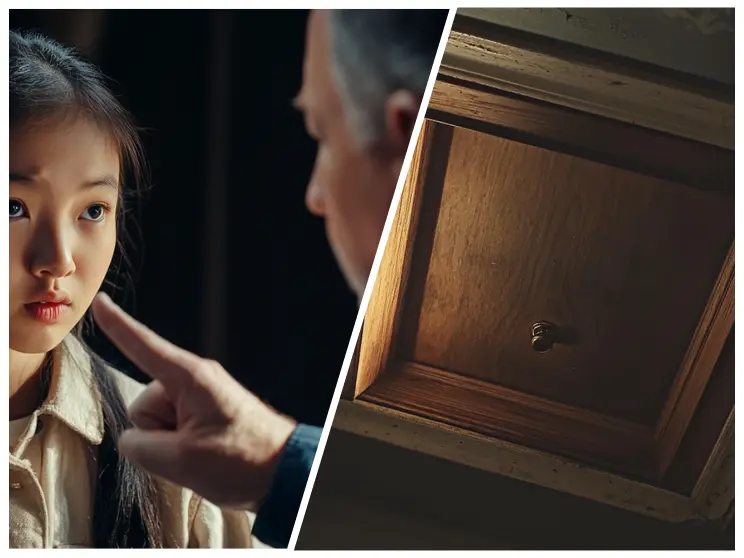They say the house belongs to her now. The papers are signed. The keys are hers. But as Elise stands at the foot of the attic stairs, she feels no ownership. Only the weight of a promise she made long ago. One her uncle made her repeat out loud.
He had told her to stay away from the attic. Never, under any circumstance, was she to go inside. Not while he was alive. Not while she lived there. He never explained why. The door was always locked, and she never asked twice. Some things didn’t need answering back then.
But now the house is empty. Her name is on the will. The attic is still locked, but the key sits in her palm. She doesn’t know what she expects to find. Something. Nothing. Either way, it feels like crossing a line he drew in permanent ink.
The house smelled like wet wood and old paper. Even before she turned the key, the scent found its way through the cracks in the doorframe, creeping into her throat like something familiar but long unspoken.

Elise hesitated on the porch, fingers wrapped around the key, her breath visible in the early spring chill. The town hadn’t changed much in fifteen years. Same sagging power lines, same shuttered bookstore on the corner.
But the house, her uncle’s, had changed. It looked worse than she remembered. The roof dipped at an odd angle now, like it had started to sigh in exhaustion. A black patch of mold curled under the second-floor window.

Weeds had swallowed the garden whole. No one had pruned the roses since he had passed. Elise opened the door. The hinges groaned. That part was the same. Inside, dust motes floated like ghosts through the slivers of light.
The furniture hadn’t moved an inch. His old leather recliner still sat in the middle of the living room, threadbare and sagging. A dried cup ring still stained the side table. It was like stepping into a memory that hadn’t yet figured out it was over.
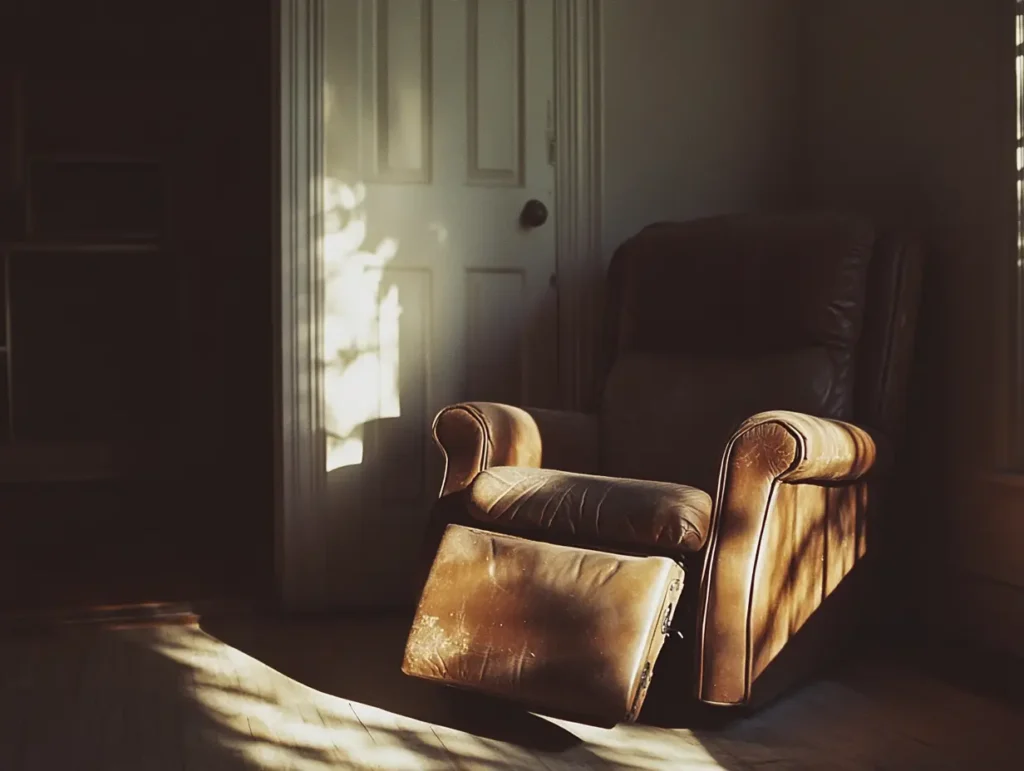
She set her bag down by the door and took a long breath. The will had been clear. The house was hers now, all of it. The land, the contents, the attic. Her name, written in careful block letters, as if her uncle had worried the lawyers might forget her otherwise.
She was the only one who stood by him in his final moments, taking care of him and being there for each hospital visit. And now, the house was hers. When she was ten, she’d asked once about the heavy padlock on the third-floor door.

He had put down his tea so sharply it sloshed onto the floor and said, without raising his voice, “You’ll never go in there. Not while I’m alive.” She’d nodded. Other kids had curious rooms and secret staircases. She had warnings.
At fourteen, she’d tried again, angling it as a joke, “What, do you keep bodies up there?” He’d just stared at her for a long moment, then walked away. That was how most of their arguments went: him retreating into silence, and her sitting in it.
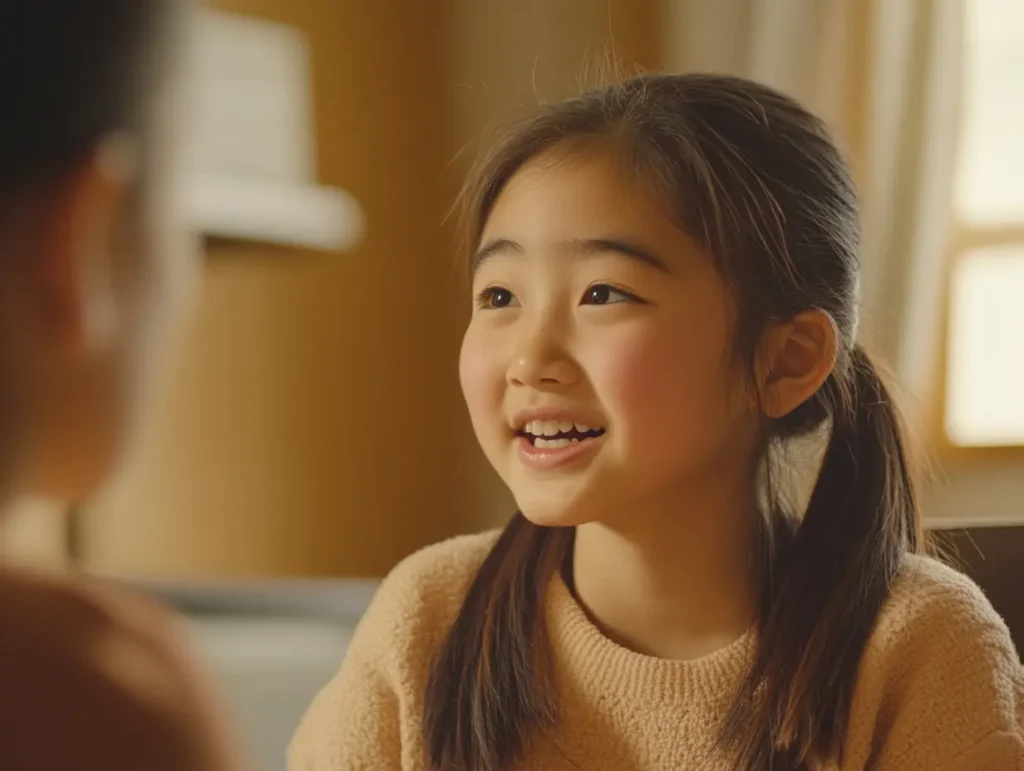
She never asked again. The last two years had been brutal. Her job in the city barely allowed remote work, but she’d pushed to make it happen. Weekends were spent in the guest room of the crumbling house, nursing a man who barely remembered to thank her.
He hadn’t been kind, not really. Sharp-tongued, impatient. But he had been hers, the only adult who took her in after the accident took her own parents. And in his own twisted way, he’d cared. That counted for something, didn’t it?

His son, Michael, had visited once. Showed up unannounced in a crisp shirt and expensive shoes, stood at the foot of the hospital bed, and asked her, not the man who raised him, what the inheritance looked like. She’d told him to leave. Michael hadn’t come to the funeral.
Elise didn’t sleep well that night. The house was too quiet in the wrong ways and too loud in others, groaning with every shift of its frame, whispering drafts down the hallway. She’d forgotten how it felt to sleep with so much emptiness around her.

Even the bed creaked like it was sighing under the weight of memory. She pulled the covers tighter and stared at the ceiling until morning. The next day, she made a list: fix the roof, replace the boiler, clear out the downstairs pantry where the mice probably still held court.
By mid-afternoon, she’d given up on the list. The bathroom sink was leaking, the light in the upstairs hallway sparked when she flipped it on, and something in the walls was definitely alive. The house wasn’t just falling apart. It was collapsing with intent.
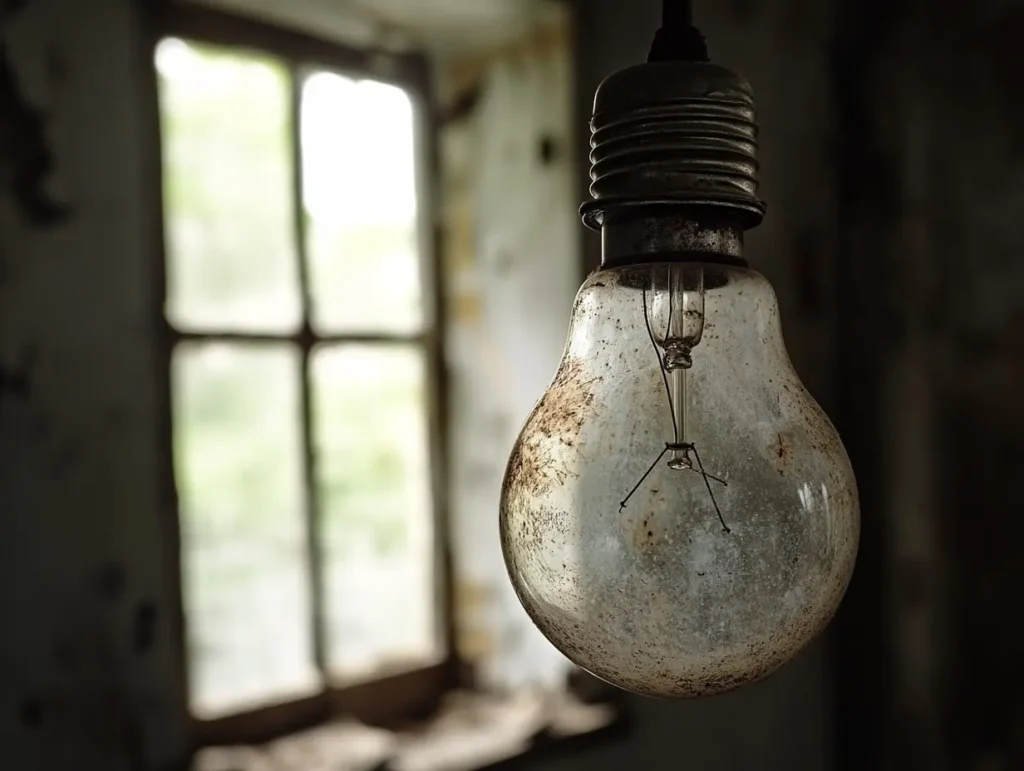
She moved room to room with a trash bag in one hand, shaking her head at old receipts, curled photographs, yellowing newspapers, and books that had long lost their spines. Her uncle hadn’t thrown anything away. Ever. It was like the past was stuffed into every corner.
At one point, she found a picture of herself at twelve, sitting on the porch steps, a cracked ceramic cat in her lap. He must’ve taken it. She couldn’t remember him ever owning a camera. Her thumb hovered over the photo, unsure if she should keep it or toss it. She kept it.
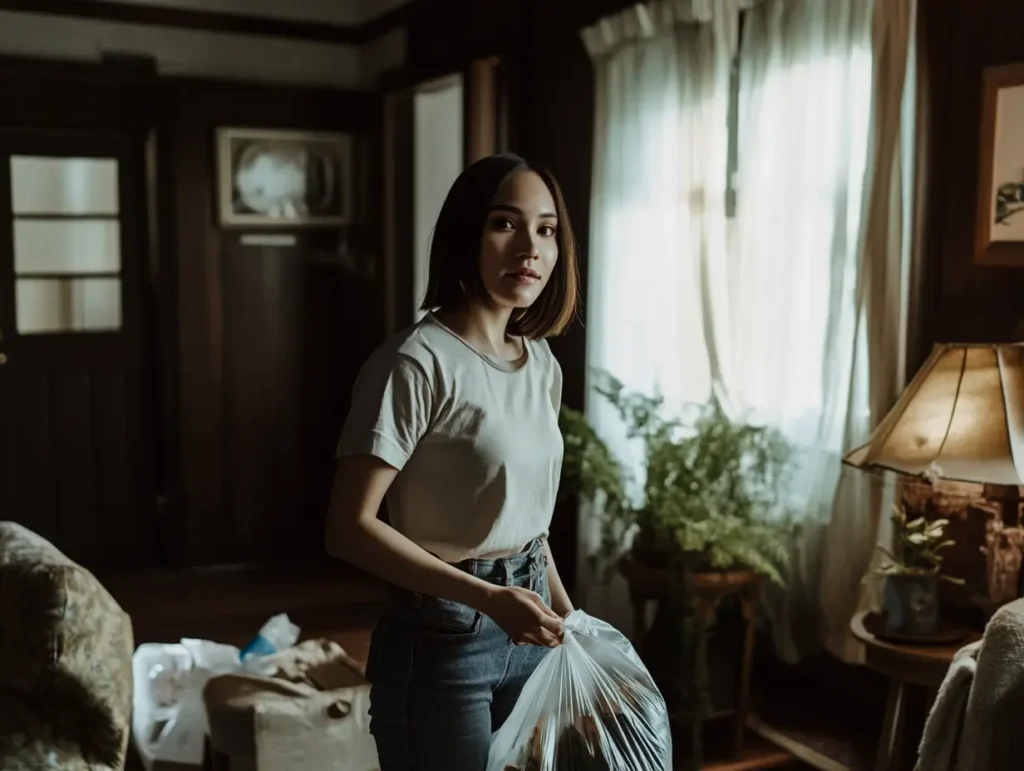
By the third day, the bitterness started to creep in. He hadn’t left a letter. Not one. No final words. No explanation. Just the house and a key to the attic. A month ago, she’d been living her life—a cramped one, sure, but a life with emails and rent and a too-small couch and frozen dinners and silence she chose.
Now she was elbow-deep in mildew, fighting a furnace from the 1970s and wondering why the only thanks she got for years of caretaking was a collapsing house and vague instructions not to open the attic “until she was ready.” Ready for what? Mold exposure? A family of raccoons?
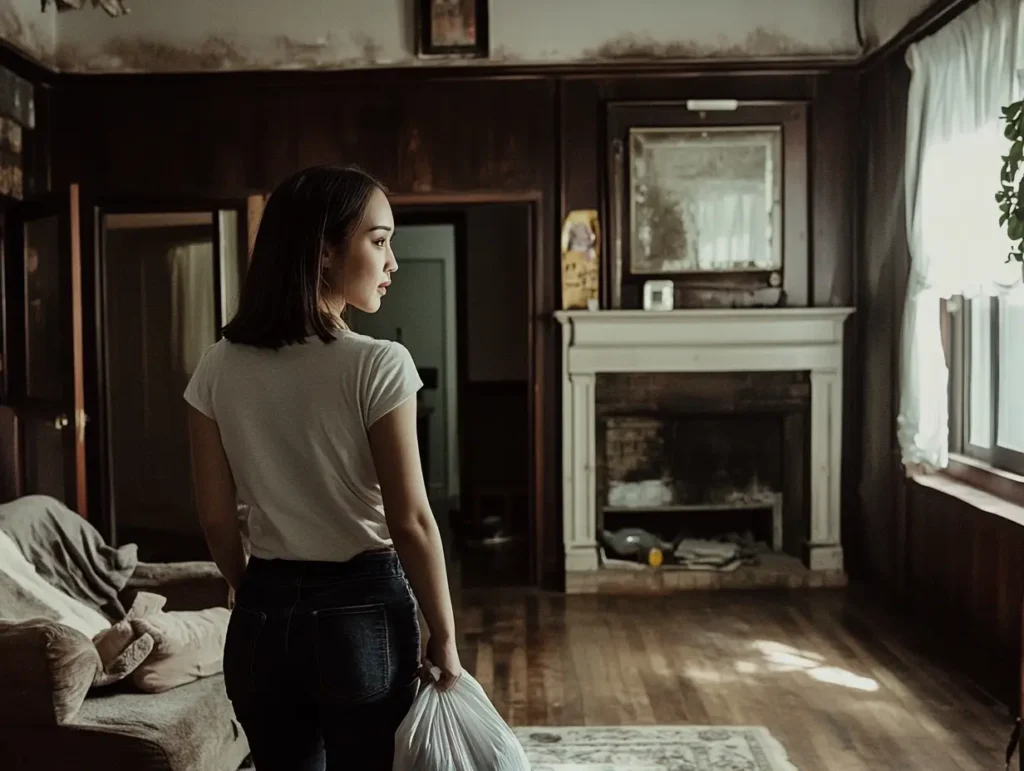
She hated how she still wanted answers from him. Michael called on the fifth day. She almost didn’t answer, but his name blinking on her phone stirred something petty in her. “Elise,” he said, his voice too smooth. “I figured you might still be there.”
“Still? You think I’d be gone already?” she retorted. “I figured you’d have had a look around. Thought you might want to… talk. About the estate,” he asked, weirdly polite. “There is no estate. Just a disaster of a house and a padlocked attic.”

“Right,” he said. “The attic. You ever wonder why he locked it?” She went still. “Why?” “I don’t know,” he said. “But I always figured it wasn’t about keeping people out. It was about hiding something.” She didn’t respond.
“Elise, he was a weird man. You don’t think it’s strange that he left everything to you and nothing to his own son?” “No,” she said. “I think it’s fitting.” He laughed, not kindly. “I just hope you enjoy that place you think you deserve so much.” Click.

She stared at the screen for a long time after the call ended, pulse drumming behind her eyes. That night, she sat at the base of the attic stairs again. The key felt heavier in her hand. She didn’t open it. Not yet. By the end of the second week, the smell was in her skin.
She’d scrubbed the kitchen walls, replaced a cabinet door, and cleared out three contractor bags of junk but it didn’t matter. The whole place still reeked of old insulation, mildew, and something harder to name.
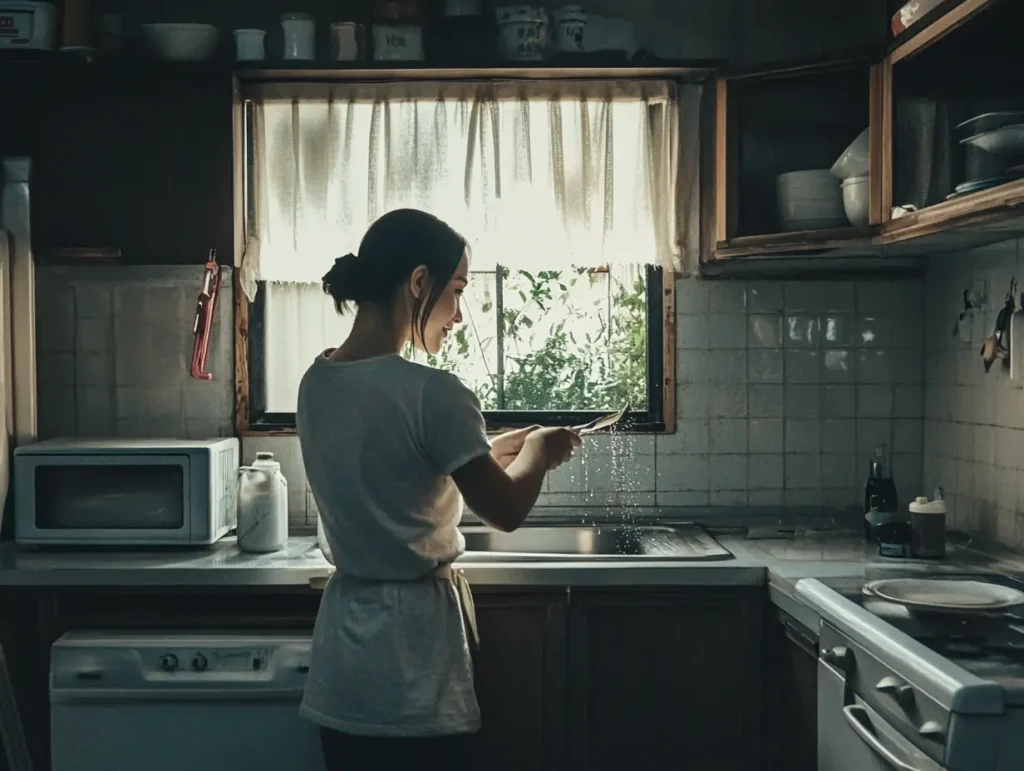
Maybe bitterness. Maybe grief. Every day she told herself she’d leave. Every day she didn’t. There was always something to fix. Something to uncover. The next morning, Elise drove into town just to feel the air move differently.
She got coffee from a place that didn’t exist fifteen years ago and sat on a bench watching kids chase pigeons across the plaza. Her phone buzzed with a text from her former boss. “You’re still planning to come back, right? HR’s asking for dates.”

She didn’t answer. Didn’t know what to say. She was thirty-three. She hadn’t planned for this. Hadn’t planned for anything, really, except doing the right thing. And now “the right thing” had left her alone in a decaying house, buried under decades of other people’s choices, too tired to be angry and too angry to grieve.
That night she woke up at 3:12 a.m. to something that vaguely resembled footsteps just above her. Measured. Slow. She sat up, breath held. Waited. Nothing. She went to the hallway, flicked on the light. The bulb popped, sending a shower of dust down from the ceiling.

In the silence that followed, she stared at the attic door. Still locked. Still waiting. Michael showed up on a Tuesday. No call. No warning. Just a knock on the front door that felt too loud for a house that had gone so long without visitors.
Elise wiped her hands on her jeans and opened it. He leaned against the frame like he owned it, like it hadn’t been twenty years since he last stood there. “Wow,” he said, glancing past her. “Looks worse than I remember.” She didn’t answer. Just stared until he cleared his throat.
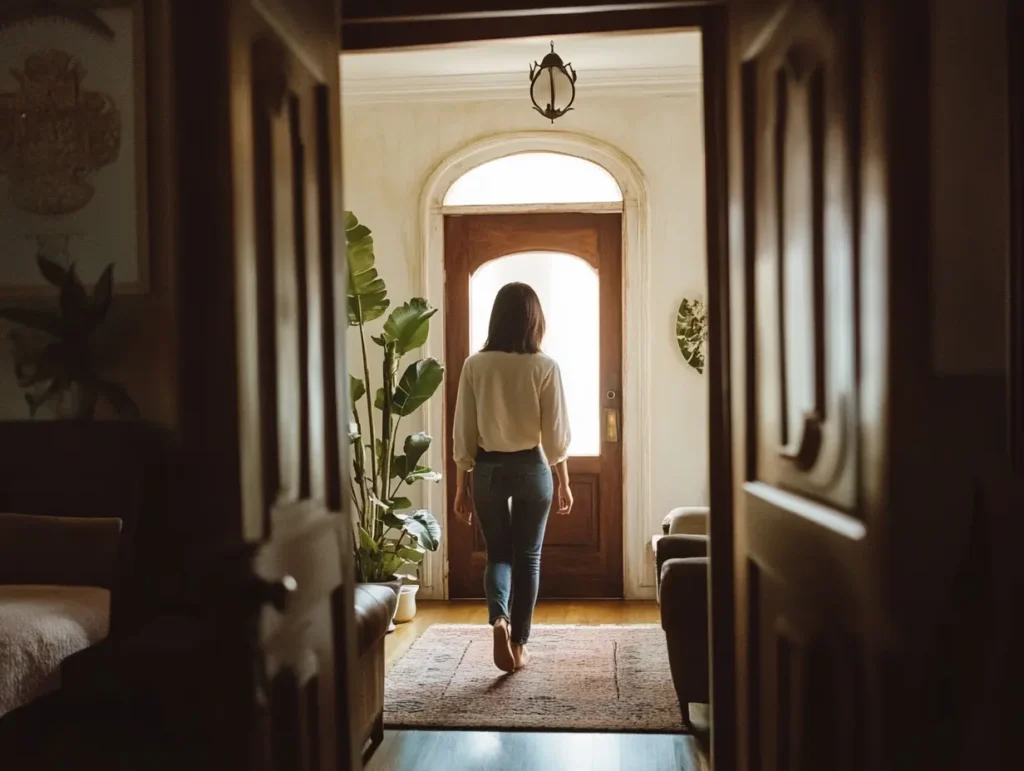
“I was in town,” he offered. “Thought I’d stop by. Pay my respects,” he said with a smug smile. “You missed the funeral.” He shrugged. “I’m here now.” She didn’t invite him in, but he stepped over the threshold anyway.
She watched his eyes roam across the wreckage, the yellowed wallpaper peeling at the seams, the sagging floorboards, the damp outline spreading near the ceiling. “Jesus,” he muttered. “He really let it rot, didn’t he?”
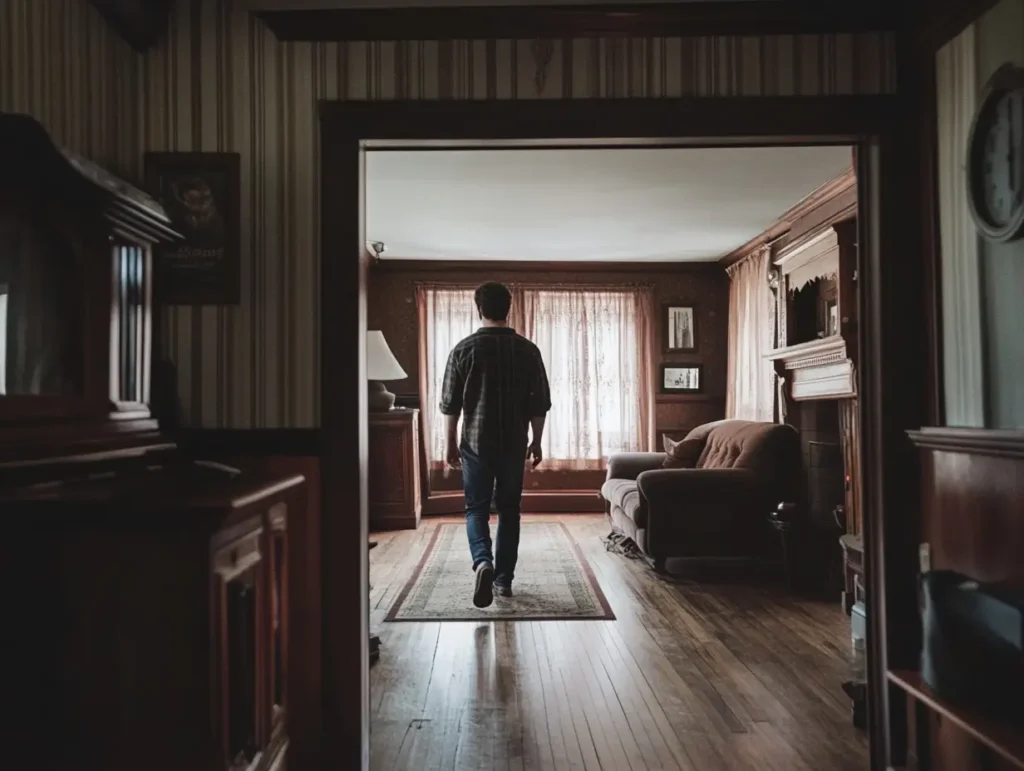
“He was dying,” Elise replied. “Yeah, and you were the lucky one who got to mop up after it.” Elise narrowed her eyes. “Is that what you think this was? Luck?” Michael smirked, but there was no humor in it. “I think you were the only one still under his spell.”
They stood in the living room. “You didn’t come for him when he was alive,” she said. “Not once.” That wiped away the smile on his face, “I did what I had to do. I got out.” Elise pointed at him, “You ran.” He didn’t deny it.

Just crossed his arms and turned his head toward the ceiling. “He ever tell you why he locked the attic?” “I asked him once,” Michael continued. “When I was a kid. He slapped me so hard I couldn’t hear out of my left ear for two days.”
Elise said nothing. “You really don’t know what’s up there?” he asked. “No.” She replied. “Not even curious?” Michael asked, trying to get something out of Elise. “Of course I’m curious,” she snapped. “But he told me not to open it.”
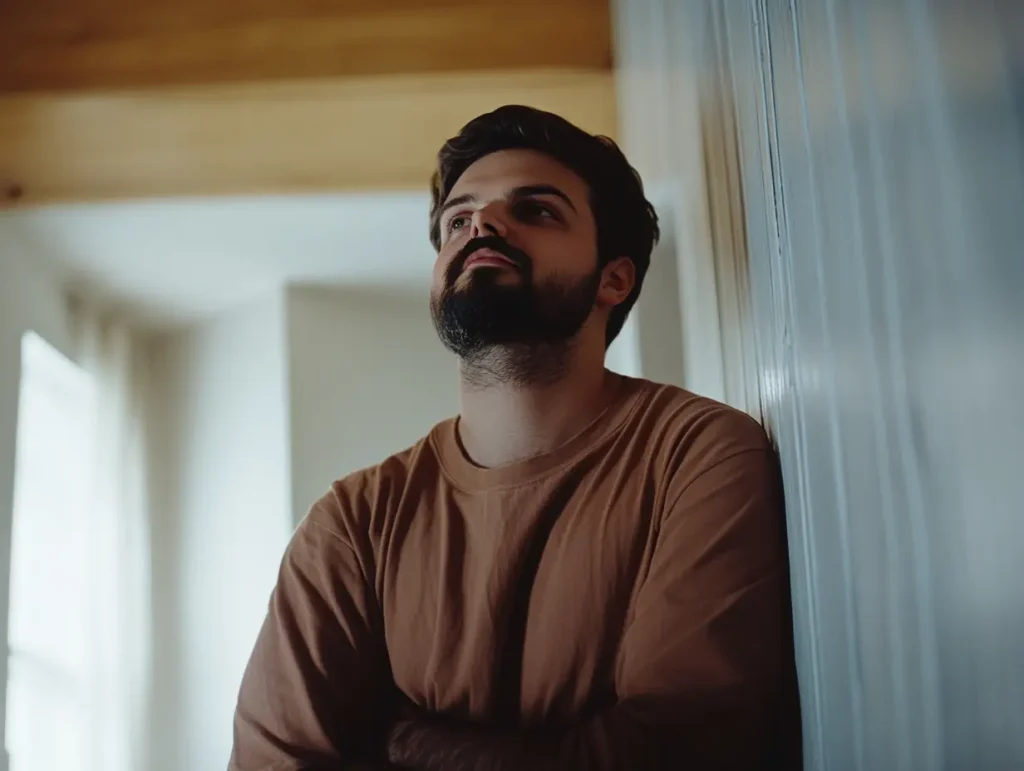
Michael laughed, dry and bitter. “And you listened. Always the good little soldier.” She stepped closer. “You have no right to be here.” Michael took a step closer too, “I have every right. He was my father.”
“He was a father in biology only. He didn’t talk about you. Not once in the past five years.” That shut him up. Michael moved toward the base of the attic stairs. “Still locked?” he asked. She didn’t answer. He ran his hand along the banister, fingers trailing dust.

“You ever wonder if he was hiding something from you? Not protecting you but punishing you.” “I’m not doing this.” “Maybe he wanted to be sure no one found what he really was.” “I said—” Michael turned, voice suddenly low.
“You think you were special because you wiped his mouth and changed his bedsheets? He just used you. Same way he used everyone. You’re just the one who stayed long enough to inherit the mess.”

Elise’s hands curled into fists. He looked at her like he pitied her. “I’m just saying, if you’re going to clean up after him, maybe it’s time to clean out everything.” He nodded toward the attic. Then he wandered out to the porch to smoke a cigarette.
They barely spoke for the rest of the afternoon. She made tea. He drank it like it was a peace offering. They avoided eye contact until the silence settled into something tolerable. Around dusk, she stood at the bottom of the attic stairs again, key in hand.
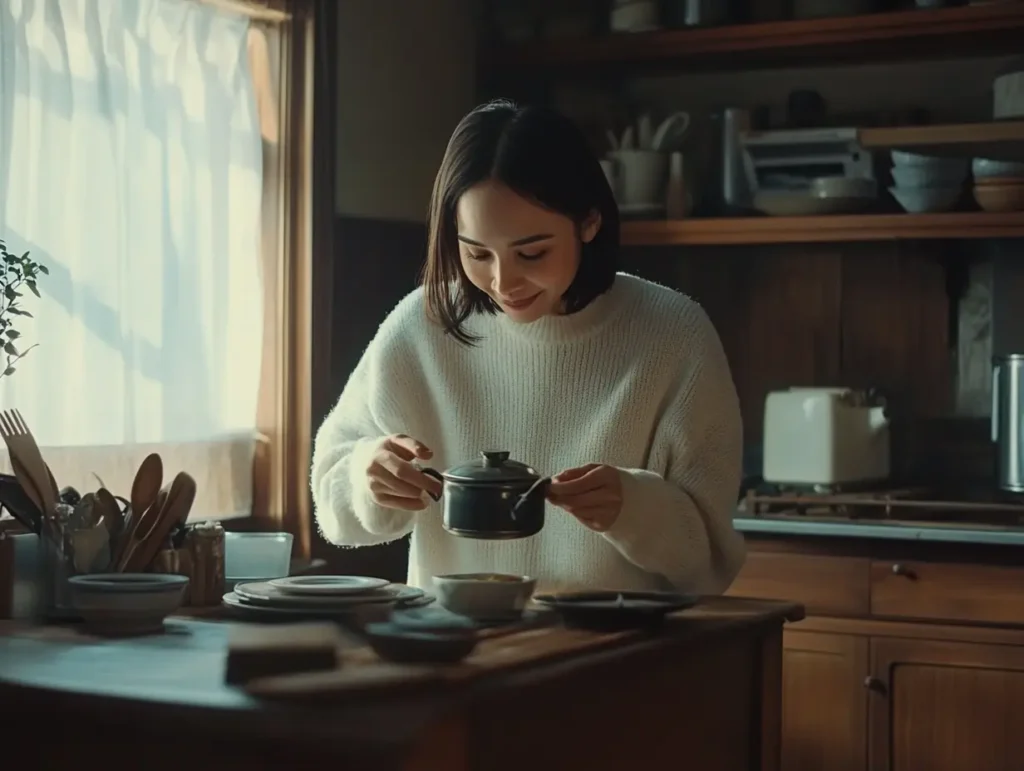
He joined her without asking. “You’re really gonna do it?” he asked. “I think so.” Michael looked at the key she was holding, he wanted to be the person to open the padlock. “Mind if I…?” She nodded. He didn’t thank her.
The key turned with a dry metallic click. For a second, nothing happened. The door didn’t swing open dramatically. It just sat there, like it, too, had forgotten how to move. Then she pushed. The door creaked open to a breath of musty, stale air.

Michael reached for the light switch inside, but it didn’t work. “Figures.” He pulled out his phone and turned on the flashlight. Elise followed close behind, her hand grazing the doorframe as she stepped into the attic for the first time in her life.
It was underwhelming. Dust clung to everything like it had been painted on. The single small window on the far wall was cracked and smeared with dirt, letting in a trickle of gray light. There were trash bags, at least ten, clustered toward the far corner, some ripped open, contents spilling out like intestines: old newspapers, rolled-up rugs, what looked like a broken fan.
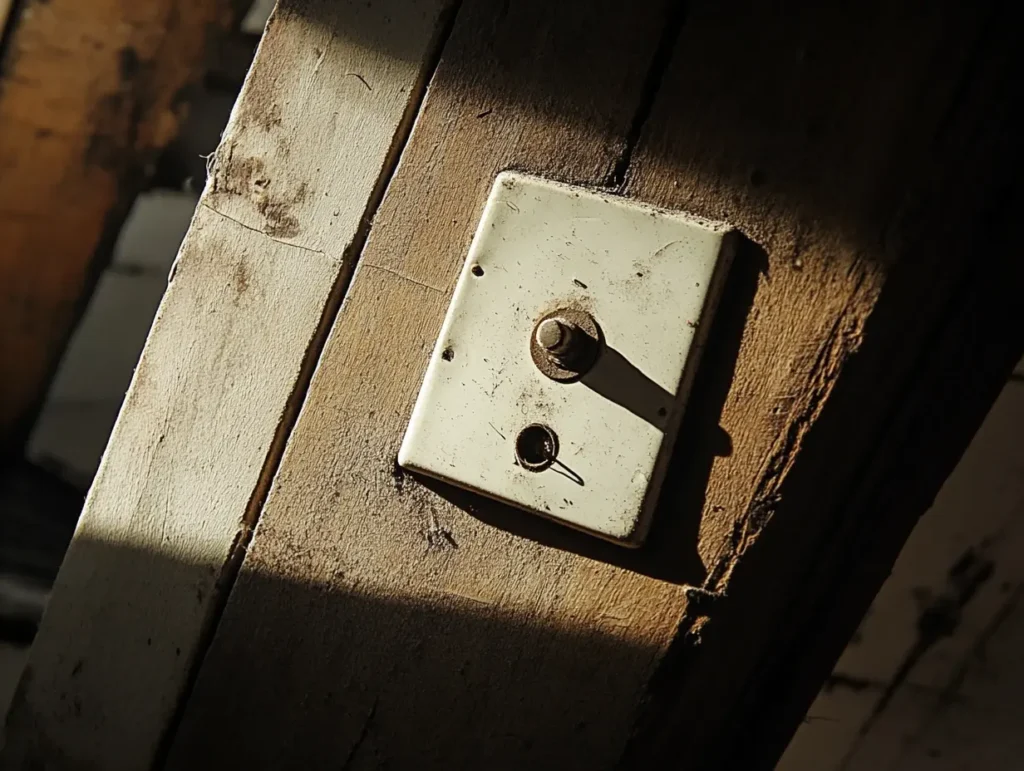
A moth-eaten armchair leaned against a wardrobe whose doors had warped open over time. A rusted bedframe. A cracked mirror. Cobwebs draped like bunting. Michael wrinkled his nose. “This is it?” Elise said nothing.
She walked slowly through the mess, scanning for something, anything, that might justify all the secrecy. All the buildup. But there was nothing worthwhile. Just junk. Just the past, rotting in the rafters. Michael kicked at one of the trash bags.
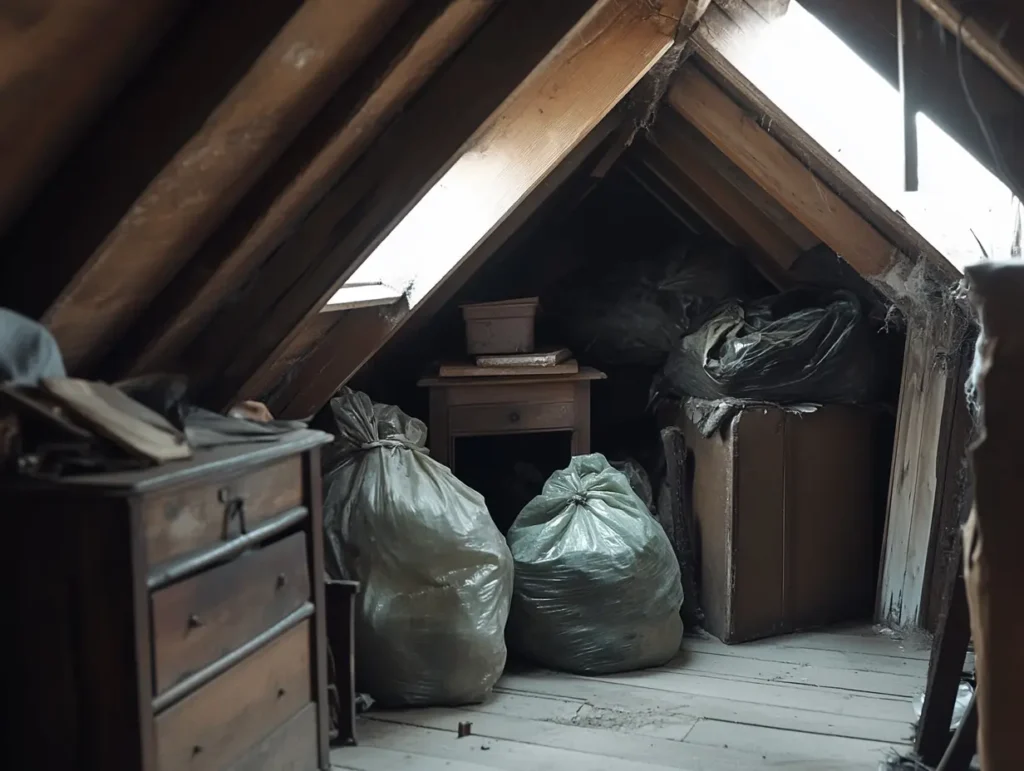
“You think this was a joke? Like he wanted you to waste your time?” he asked, his smug smile returning. “I don’t know.” He shined his light toward a pile of mildewed boxes. “This is garbage. He made you wait years for this?”
Elise’s throat tightened. “He never said there was anything up here. He just told me not to come.” Michael scoffed. “Of course he did. That’s how he worked. Dangle something in front of you, then punish you for wanting it.”
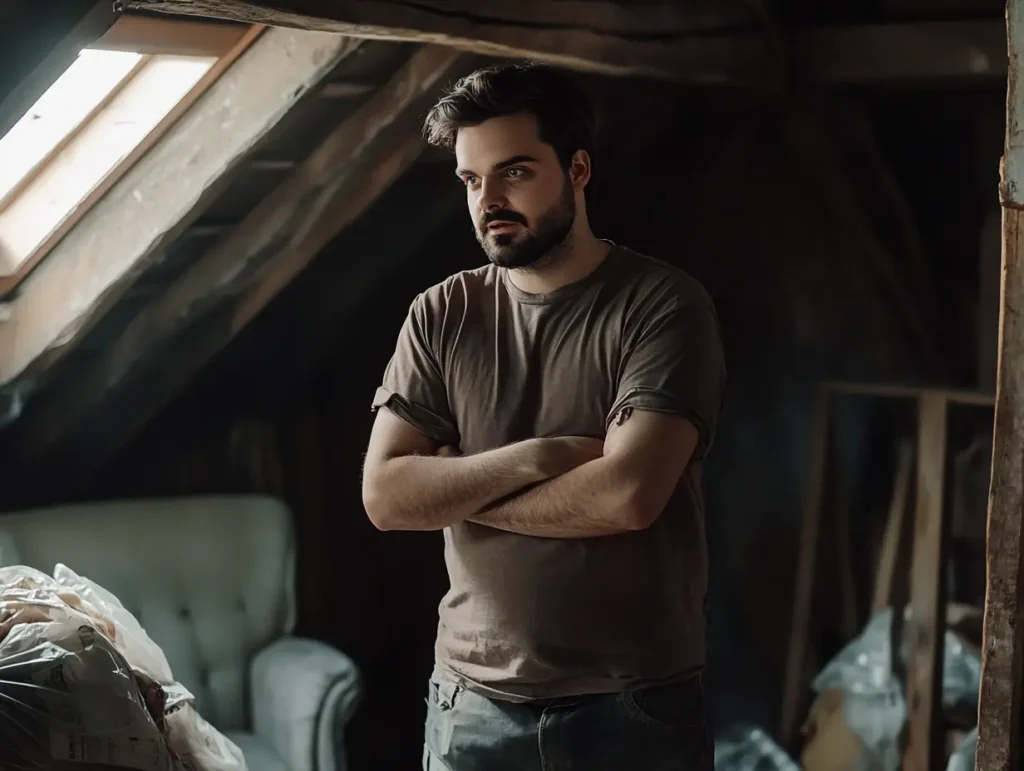
She turned on him, suddenly sharp. “You didn’t know him.” Michael scowled, “I knew enough.” They stood there, surrounded by the slow death of paper and wood. Elise took a shaky breath. The attic smelled like mold and insulation and maybe a trace of old cologne, like the last ghost of a man who never fully lived in the world the way others did.
Michael looked bored now. The curiosity was gone. The mystery deflated. He muttered something about it being a waste of time under his breath and started back down the stairs. Elise stayed behind, kneeling near the furthest trash bag.
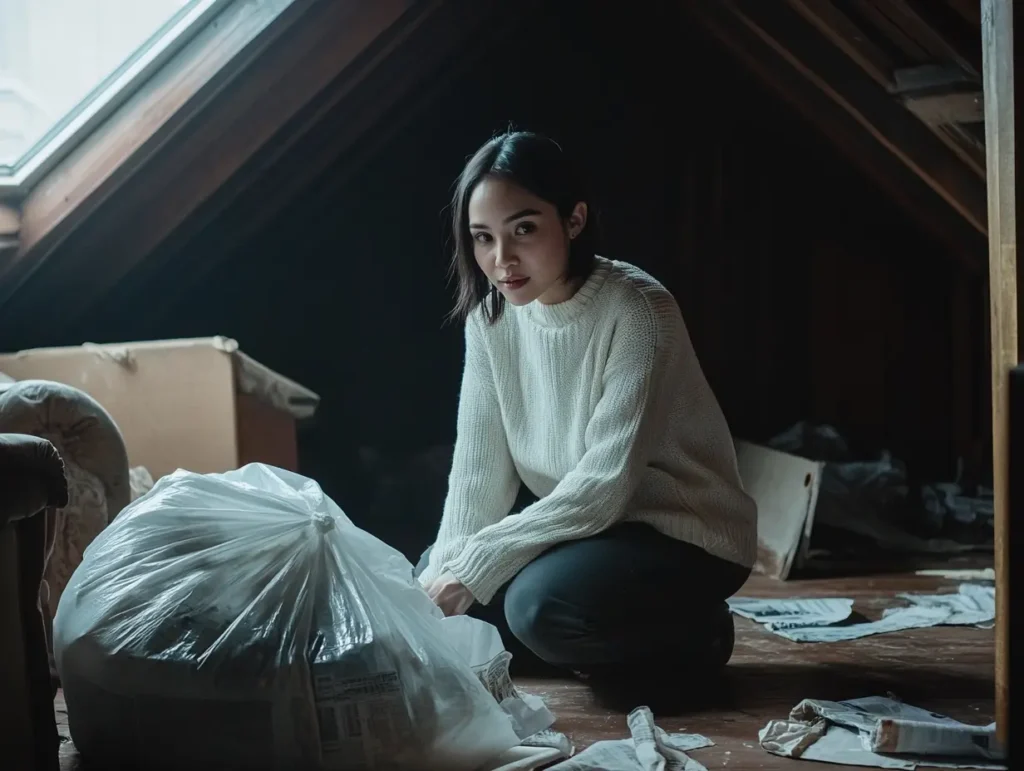
She pulled it open carefully, not expecting anything. Maybe not even hoping. But inside, she found a box. Small. Wooden. Tied shut with twine. By the time Elise came back down from the attic, Michael was already grabbing his keys.
“Guess that was it,” he said flatly. “Your big reward.” She didn’t answer. He paused in the doorway, squinting at her. “You gonna stay here?” “I don’t know.” He nodded slowly. “Well. Good luck with it.” He didn’t offer a hug. Didn’t shake her hand.

Just walked out, the screen door slamming gently behind him. She watched from the front window as he climbed into his car and backed out of the gravel driveway without looking back. For a moment, the silence that followed felt final.
Like the end of a long, ugly conversation. She didn’t return to the attic right away. She sat in the kitchen with a cup of tea gone cold and stared at the box she’d brought down. Small, plain, and tied with thin twine. It could’ve held anything: old letters, dead bugs, a prank.

Something in her half-expected confetti to fly out when she opened it, her uncle’s final joke. But when she undid the string and lifted the lid, there was no punchline. Just a stack of envelopes. Each marked in the same careful handwriting: “For Elise – Age 10” “For Elise – Age 17” “For Elise – When You Feel Trapped” “For Elise – After I’m Gone” Her breath caught.
Some were sealed. Others had been opened and resealed. One had a dried teabag tucked inside, along with a single sentence written in blue ink: “You liked this kind. I kept it on the shelf even when you stopped visiting.” She turned the envelopes over in her hands, heart pounding, unsure where to start. Eventually, she opened the one labeled “After I’m Gone.”

It wasn’t long.“I know you’ll be angry. Maybe I deserve that. Maybe I don’t. But I couldn’t leave anything out in the open, not with how they treated you. Especially Michael. He would’ve torn through everything and sold it off within days. This house would’ve been gone by now.”
“The attic, it was the only place I could hide something for you and be sure you’d wait long enough to deserve it, or to decide if you still wanted it. If you’re reading this, you stayed. That’s more than I could’ve hoped for. I’m sorry I didn’t know how to say thank you. I was never good at it. But you were the only one who stayed.”

“So everything I had, everything that mattered, is yours. I just wish I’d said that out loud when I could.” No signature. No “love.” But still, it hit like a hand on her shoulder, warm and heavy. She didn’t cry. Not right away.
Behind the torn furniture, she found a second box, this one tucked behind a false wall panel. Inside were documents: old certificates, stocks, bank statements in her name. He’d transferred things quietly over the years.
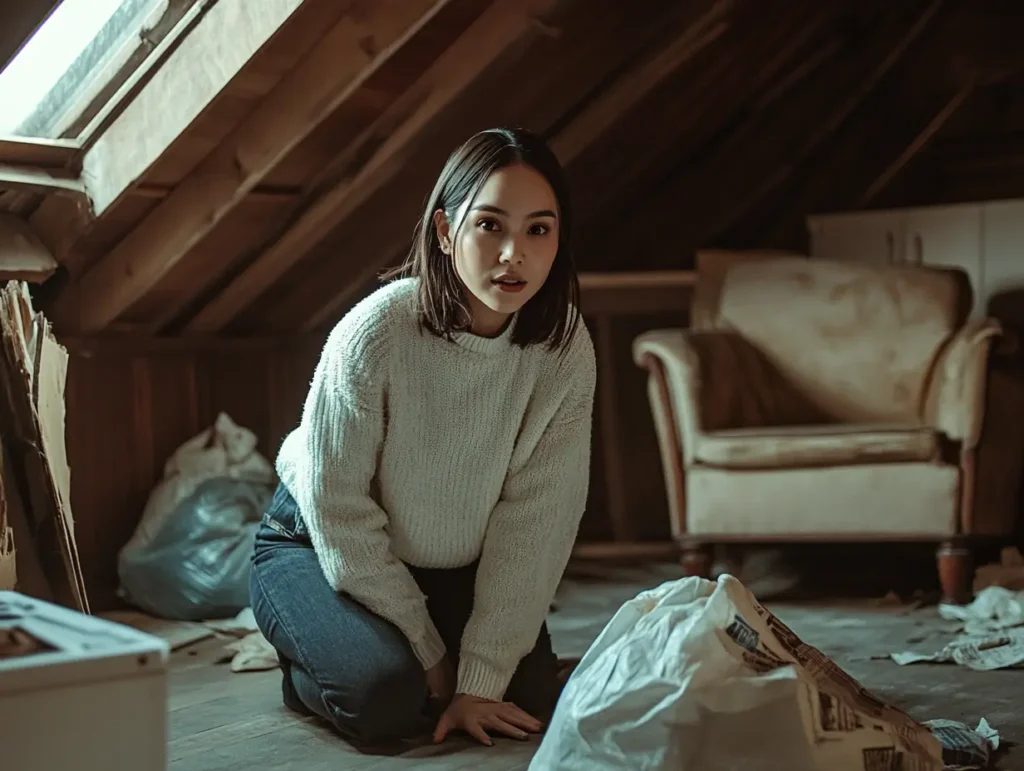
Most were modest; bonds, savings, a modest account in a local bank, but one folder held a deed to a plot of land she’d never heard of, in a town two states over. Next to it was a post-it note: “The lake view was always your favourite.” She sat back on her heels, the dust biting at her throat, the weight of it all settling in.
Elise left the boxes untouched for a day. She stacked them neatly in the corner of the living room not hidden, but not ready to be faced again. Like they were guests she wasn’t sure how to greet. Instead, she cleaned.

Not in the hopeful, let’s-make-this-place-mine kind of way, but mechanically. She scrubbed the kitchen tiles until her knuckles turned red. She threw out a drawer full of warped Tupperware, washed curtains that disintegrated in the machine, vacuumed dust that never seemed to disappear.
The house fought her every step of the way. A pipe burst under the sink. The circuit breaker tripped twice. A bird died in the chimney, leaving a sour smell that wouldn’t lift. Every time she thought about the attic, a different feeling took hold. Gratitude. Anger. Guilt. Relief. Bitterness. Repeat.

That night, she sat on the back steps with a beer and stared at the yard; overgrown, tangled, wild in a way it hadn’t been when she was a child. Somewhere under all that was a garden. She remembered helping plant it once, her small hands digging into the dirt while her uncle muttered about spacing and sun exposure.
He’d never praised her. Not directly. But the next day he’d brought home a pair of kid-sized gardening gloves. She still had them. Somewhere. She took a long sip and let the cold settle into her chest.

In the morning, she reread the letter. “You were the only one who stayed.” There it was again, the weight of obligation wrapped up as praise. As if her staying had been inevitable. As if that was love. What she wanted was for him to tell her she didn’t have to. That she could have gone and still been loved.
But that wasn’t who he was. She understood that now. Didn’t forgive it, exactly. But understood. And somewhere, buried under all the resentment, she knew he had tried. In his way. In the only way he knew.

She spent the rest of the afternoon cataloging the contents of the boxes. The land deed was real, a small lakeside plot in upstate New York, apparently untouched for over a decade. The bank accounts were modest but stable. Enough to fix this place, if she wanted. Enough to leave, if she didn’t.
What surprised her most was the notebook at the very bottom of one box. Just her name on the cover. Inside were pages of sketches. Drawings of the house. Of the garden. Of her. Not good drawings, shaky lines, uneven shading, but careful ones. Thoughtful. There was a note under one: “Age 12. Elise fell asleep outside again. I didn’t wake her. She looks peaceful.”

She ran her fingers over the pencil lines. Her throat ached. He’d seen her. He just never told her he was looking. That night, she didn’t dream. When she woke, the house felt quiet, not empty, but no longer resisting her. She stood in the hallway outside the attic, the door still hanging open, the smell of dust and time drifting down the stairs.
She could stay. She could go. But for the first time, it felt like the choice was hers. The next morning, Elise woke up before sunrise. The house was still. No groans in the floorboards, no wind tapping the shutters. Just light creeping softly through the blinds, like the world was trying not to wake her too soon.

She made coffee and stood barefoot in the kitchen, staring out at the yard. The fog was lifting. She thought about the attic. The boxes. The weight of it all. And how, somehow, it had begun to feel lighter. Not because anything had changed—but because she had finally looked.
